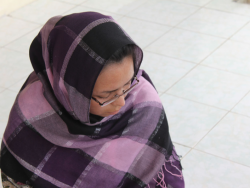
Yogyakarta, 8 March 2012 – How am I going to provide for my children? This question passes through the minds of all parents. But for some, it is a daily question that motivates their every move.
Adelah and Farzan wondered that same thing when they arrived in Indonesia. They had just escaped Afghanistan with their two children after the restaurant where Adelah worked was shot up in a skirmish between Taliban and government workers.
According to recent research done by JRS the refugee status process can take up to 2.5 years in Indonesia without the legal ability to work. So these parents wondered how, new to a country where they knew no one and didn’t speak the language, how in a place where they couldn’t legally work they would provide for their children.
Bake bread, of course.
“We knew we were in an Afghani neighbourhood, and we Afghani people eat bread with every meal,” she said.
So she decided to bake and sell these large, round flat breads. Of course, she never baked bread in her life before. Farzan remembers this, laughing. The two are almost always smiling and laughing, refusing to be brought down by their circumstances.
“I remember the first few weeks ruining the bread more than once. Or I would take it out of the oven and taste one realising I forgot something in the dough,” she said.
But things have smoothed out in their bread-making operation. They wake up before dawn and get the giant mixing bowls down from the shelves. Farzan prepares the dough and Adelah mixes it together.
“Some mornings it is hard for me to mix the tough dough,” he said, revealing one scarred right hand that is just smaller than his left. “The Taliban broke my hand a few years ago and it healed on its own. Sometimes it hurts to mix with this hand. But if we don’t make the bread, we cannot earn money and our children cannot eat.”
But Adelah and Farzan are two of the luckier parents seeking refuge in Indonesia. Because it is not a signatory to the convention many people are not able to find a way to make a living and rely on the meagre assistance of NGOs and church groups.
Others find themselves trapped in on of Indonesia’s immigration detention centres with their children. Because so many boats filled with asylum seekers transit through Indonesia every year, the Australian government has been putting money into building and maintaining detention centres in Indonesia so they never make it to Australian shores.
But Adelah and Farzan try not to think about that. They just try to make life as normal for their family as they can while they wait for their refugee decision from the UN’s refugee agency (UNHCR).
As they were finishing their tea, their oldest daughter Mariama came bouncing through the living room, hair in pigtails, wearing a bright red dress. She said hello to the JRS staff sitting there, in her best Indonesian Bahasa. Then she said hello in English. She laughs with her dad when he shows the JRS staff his English language homework. With so much on his mind, he is learning more slowly than his wife and daughter.
This seven year old is now enrolled in Indonesian school and spends her days off playing in the street with her Indonesian neighbours. And for all of the English she has learned, she doesn’t know the word “refugee.”
“My daughter asks me why we moved to Indonesia,” Farzan said. “I tell her because it is a beautiful country it is more fun here. And she doesn’t ask anymore. I cannot tell her why we left or that we can never go back.”
Farzan starts to cry. And then she smiles, and keeps smiling until we leave.


